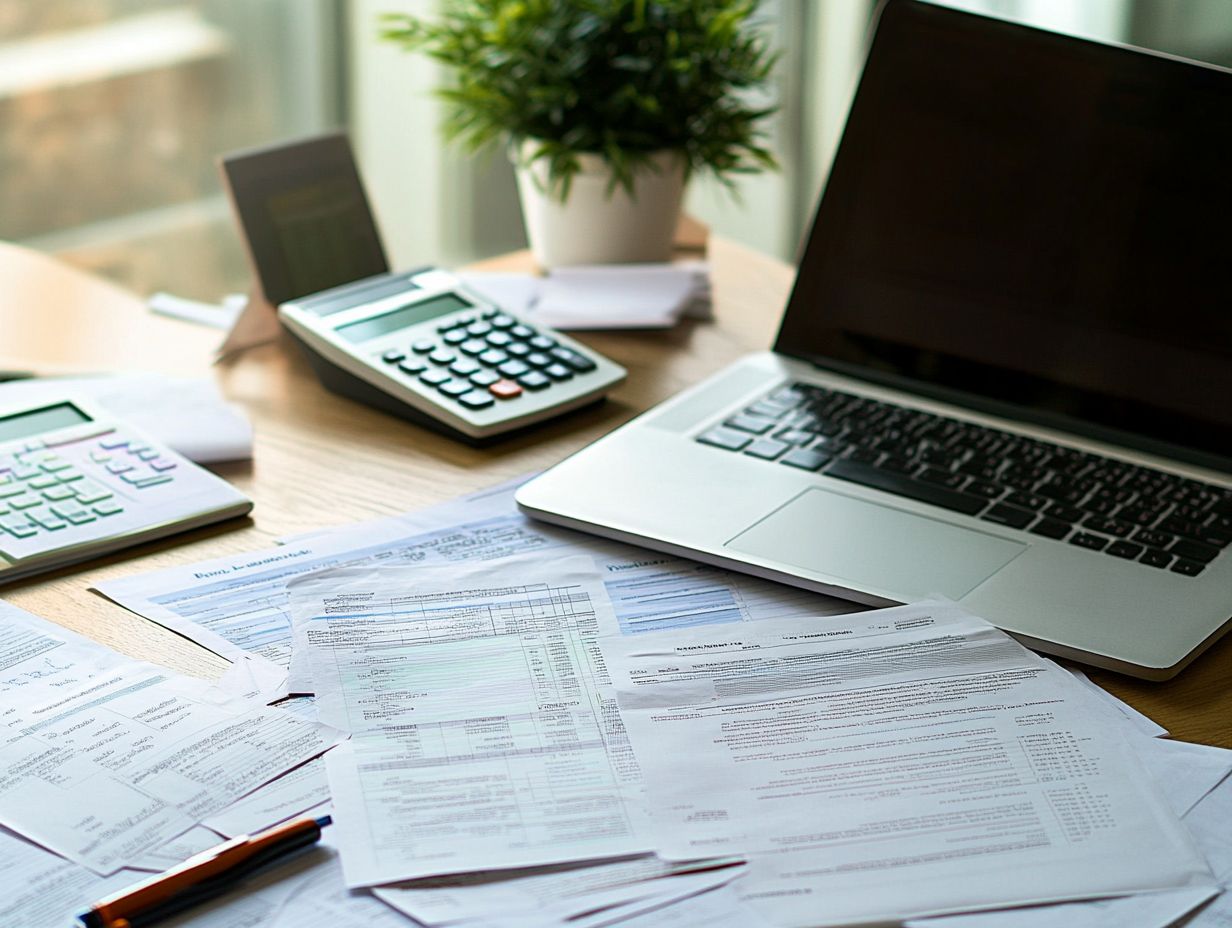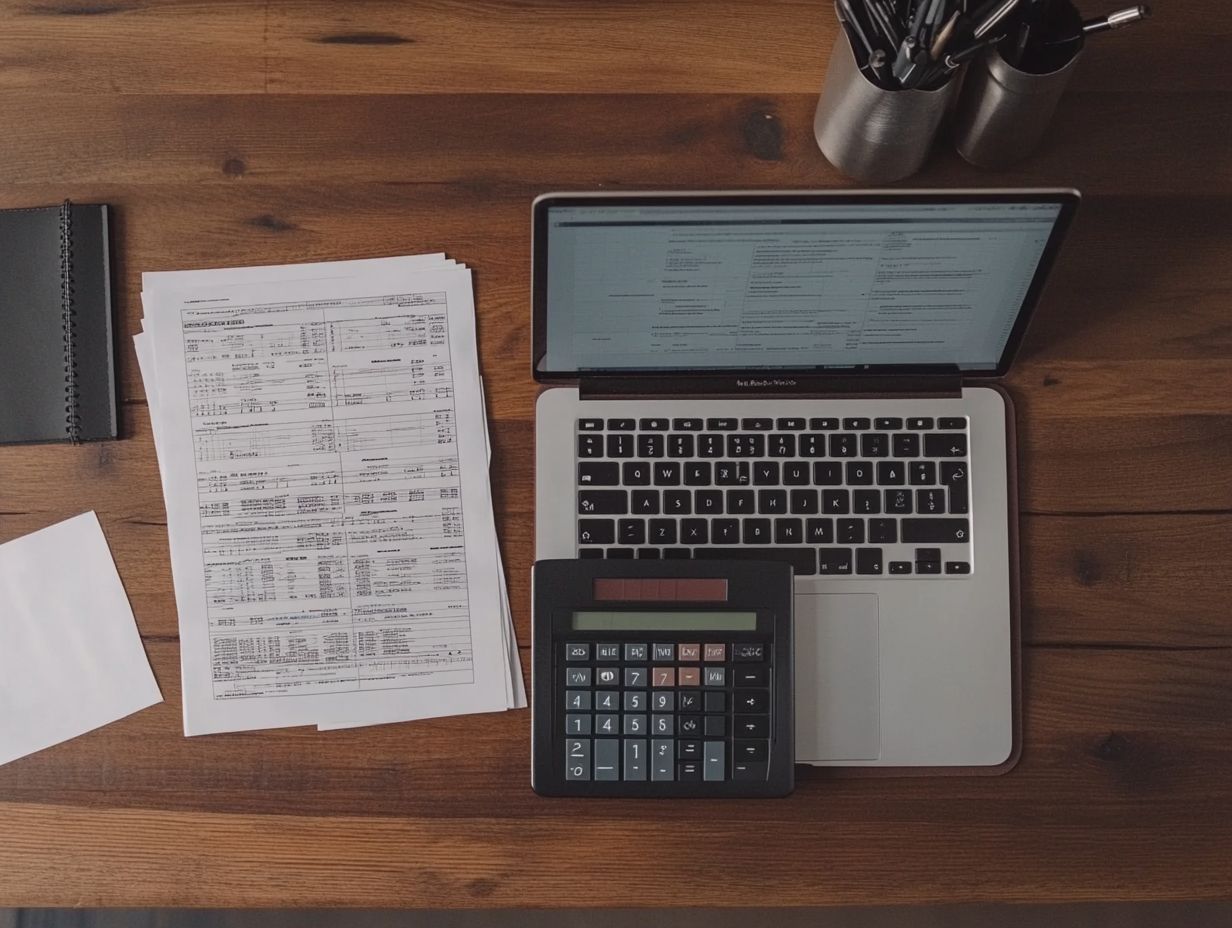The Importance of Keeping Accurate Records for Taxes
Maintaining accurate tax records is essential for you, whether you’re an individual or a business. It sets the stage for a seamless tax season and helps you sidestep unnecessary penalties and audits.
This article delves into the various types of records you should keep, ranging from income and expense documentation to receipts and invoices. You’ll also find best practices for organizing and storing these records, along with technology tools and tips to help you avoid common pitfalls.
Furthermore, discover the considerable benefits of diligent record-keeping, including the potential to save both time and money. Learn how to streamline your tax responsibilities with ease!
Contents
Key Takeaways:

- Avoid penalties and audits by keeping accurate tax records.
- Organize and store income, expenses, receipts, and invoices for easy record keeping.
- Using technology and proper record-keeping practices can save time and money in the long run.
Why Accurate Tax Records are Important
Accurate tax records are more than just paperwork; they are your shield against penalties and audits from the IRS. By diligently maintaining precise records of your income, expenses, and related documents, you set the stage for substantiating your claims and ensuring that every financial transaction is properly tracked and reported.
This meticulous recordkeeping not only provides proof of ownership but also supports deductions that could significantly influence your tax return. Embracing this proactive approach to financial documentation can streamline your processes and enhance your legal compliance.
Avoiding Penalties and Audits
One of the primary reasons you should maintain accurate tax records is to steer clear of penalties and audits from the IRS, which can carry serious consequences.
When every receipt, bank statement, and financial document is meticulously organized, you create a buffer between yourself and potential financial turmoil. The IRS typically examines discrepancies in reported income, excessive deductions, and missing documentation during audits. To support your claims, having records like invoices, travel logs, and proof of charitable contributions is essential.
Keeping organized digital copies of all relevant documents enhances your compliance efforts. Familiarizing yourself with IRS guidelines and deadlines means you will avoid late submissions and penalties, thus considerably reducing your risk of undergoing an audit.
Types of Records to Keep
Maintaining a meticulous record of various types is crucial for effective tax management, particularly for businesses and freelancers who must accurately document their income and expenses.
Key records to keep include income statements like 1099s and comprehensive financial statements, alongside detailed expense documentation, which may consist of receipts and invoices.
The capacity to substantiate deductions and claims with robust evidence is essential for compliance and can profoundly influence your tax obligations.
Income and Expense Records
Income and expense records are fundamental to your financial management, acting as the bedrock for tracking performance and understanding your tax obligations.
By meticulously documenting every financial transaction, you gain invaluable insight into your spending habits while ensuring you stay compliant with tax regulations.
Whether you choose accounting software, spreadsheets, or even a trusty notebook, these tools make tracking and organizing your finances straightforward.
Your income may come from various sources, including wages, freelance work, or rental income, while deductible expenses can encompass utilities, business travel, and certain educational costs. Grasping these details is crucial, as they directly affect your taxable income and can unlock potential deductions. This not only minimizes your tax liability but also enhances your overall financial health.
Receipts and Invoices

Receipts and invoices are essential documents that prove your financial transactions and support tax deductions for both businesses and individuals.
These documents do more than just prove the expenses you’ve incurred. They also play a vital role in maintaining accurate financial records, which can be invaluable during audits or when you need to seek reimbursement.
By organizing your receipts and invoices effectively, you can ensure that nothing gets lost. This makes it easier to access them when needed.
Best practices involve categorizing these documents by date or type of expense. Store them in a secure yet accessible location whether in digital format or a dedicated filing system. Understanding the legal requirements regarding documentation is vital don t overlook this!
Generally, it s advisable to keep these records for a minimum of three to seven years, depending on your jurisdiction.
Organizing and Storing Your Tax Records
Efficiently organizing and storing tax records allows easy access to your financial information whenever needed especially during tax season or audits.
Implementing a strong organization system for your documents enables quick retrieval of vital information. This ensures compliance with IRS (Internal Revenue Service) requirements while enhancing your overall financial management.
Adopting best practices for record storage safeguards your documentation against potential loss or damage over the years. This secures your financial future with confidence.
Best Practices for Record Keeping
Implementing best practices for record keeping is essential. This ensures that all financial documentation remains organized, secure, and easily accessible, promoting compliance with IRS regulations.
A well-structured filing system saves you time during audits and significantly reduces the risk of losing crucial documents.
By consistently categorizing your records whether by date, type, or project you can easily retrieve any necessary information.
Regularly backing up all financial data safeguards against unexpected data loss, which could disrupt your operational efficiency.
Maintaining up-to-date records should be done on a scheduled basis to accurately reflect current transactions.
By following these practices, your organization can enhance financial transparency. This makes it easier for you to analyze performance and adhere to compliance standards without unnecessary stress.
Using Technology to Keep Accurate Records
Leveraging technology for record keeping has transformed how you manage your financial documentation. It brings automation and enhanced accuracy to your financial management.
With a range of specialized tools and apps available for tracking income and expenses, you can streamline your recordkeeping processes, minimize human error, and ensure compliance with IRS regulations.
Embracing technology not only saves you time but also offers a secure platform for safeguarding essential financial information.
Tools and Apps for Record Keeping
A wide array of tools and apps is available to enhance your record-keeping. This simplifies managing financial transactions and complying with IRS requirements.
These resources streamline the recording process and offer features like automatic data imports, customizable reporting, and real-time expense tracking.
If you re a freelancer, expense management apps can simplify tracking deductible costs, which are expenses you can subtract from your total income to reduce your tax liability.
Small business owners might find comprehensive accounting software more beneficial, as it integrates payroll and inventory management seamlessly.
While some tools are designed for user-friendliness, others may present a steeper learning curve but offer advanced analytics in return. Evaluate these options carefully to ensure the solution you choose aligns with your financial needs, ultimately enhancing accuracy and efficiency in your tax preparation.
Automation features can significantly alleviate the burden of manual entry, allowing you to shift your focus toward more strategic financial planning.
Start organizing your records today to secure your financial future!
Tips for Keeping Accurate Records

Maintaining accurate records demands your diligence and a keen eye for detail. By implementing effective tips for record management, you can sidestep common pitfalls that could lead to penalties or audits.
Adhering to clear documentation guidelines allows you, whether as an individual or a business, to build a strong base for financial management and ensure compliance with IRS regulations.
Being aware of potential pitfalls and embracing best practices is essential for preserving the integrity of your financial records over time.
Common Mistakes to Avoid
Recognizing common mistakes in record keeping is crucial to ensure the accuracy of your financial documentation and maintain compliance with IRS regulations. Many individuals and businesses often overlook essential aspects of financial management.
This oversight can lead to significant repercussions down the line. One prevalent issue you might encounter is the failure to sort your spending into categories; this can distort your financial reports and mislead your decision-making process.
Neglecting to keep receipts hampers your ability to validate expenses and can also trigger audits. Another common error is not updating records promptly, resulting in outdated information that skews financial analysis and projections.
To mitigate these pitfalls, it s wise to implement a systematic approach to record keeping that includes:
- Organizing expenses into clear categories,
- Utilizing digital tools for receipt management,
- Establishing a regular schedule for updates.
By adopting these best practices, you can greatly enhance your financial accuracy and compliance.
Benefits of Keeping Accurate Tax Records
Keeping accurate tax records offers benefits that go well beyond mere compliance. It can lead to considerable financial savings, help you manage both personal and business finances more effectively, and provide you with peace of mind regarding your tax obligations.
By diligently tracking your income and expenses, you ll be able to pinpoint eligible deductions and streamline the tax filing process. This preparation will help you feel confident during any potential audits.
Maintaining precise tax records also enhances your financial planning, empowering you to make informed decisions and ultimately improve your overall financial well-being.
Saving Time and Money
One of the most compelling benefits of maintaining accurate tax records is the potential for saving both time and money during tax season and beyond.
When you keep your financial documentation organized and up-to-date, you streamline the process of preparing your tax returns. This can dramatically cut down the hours you spend sorting through paperwork as the deadline looms.
With meticulous records, you re less likely to miss deductions, which minimizes the risk of overpaying taxes.
To enhance your record-keeping, consider these practical steps:
- Use digital tools or apps to track expenses.
- Systematically categorize your documents.
- Regularly review your financial statements.
By adopting these practices, you not only save valuable time but also empower yourself to make more informed financial decisions throughout the year.
Frequently Asked Questions
Why is keeping accurate records for taxes important?

Accurate record keeping is crucial for ensuring that you report the correct amount of income and deductions on your tax return. This accuracy can significantly affect your tax liability.
What types of records should I keep for taxes?
You should keep records of all income, such as W-2s and 1099s, as well as any deductions and expenses, such as receipts for charitable donations and business expenses.
Can accurate record keeping save me money on taxes?
Yes, keeping accurate records can help you claim all eligible deductions and expenses. This can potentially reduce your taxable income and save you money on taxes.
What happens if I don t keep accurate tax records?
If you are reviewed by the tax agency without accurate records, you could face paying back taxes and penalties. This could even lead to serious consequences, like criminal charges for tax evasion.
How long should I keep my tax records?
The tax agency suggests keeping records for at least three years after you file your taxes. It s wise to hold onto them for up to seven years in case your records are reviewed.
Should I keep physical or digital copies of my tax records?
You can choose either physical or digital records, as long as they are organized and easy to find. Digital copies are often easier to store and access over time.














